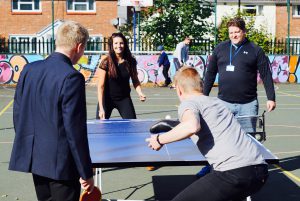

Rebuilding young lives through mentoring and sport
Society’s most hard-to-reach young people often have a history of childhood trauma, mental health problems, drug and alcohol abuse, anti-social behaviour and persistent offending. Pause & Engage helps at-risk youngsters in north Somerset work through these issues, with sport at the heart of their approach.
 Launched by the Jack Hazeldine Foundation in 2015, the programme now employs 20 mentors who use sport and physical activity to forge connections with young people who have a wide range of complex needs.
Launched by the Jack Hazeldine Foundation in 2015, the programme now employs 20 mentors who use sport and physical activity to forge connections with young people who have a wide range of complex needs.
Once referred to them by schools, SEN staff, Pupil Referral Units, Youth Offending Teams or social services, the programme’s first aim is to build the young people’s self-esteem and social skills.
“Engaging them effectively at the start is absolutely key,” says Operations Director Ben Littleton. “Nothing else matters except building a prosocial and stable relationship. Without that, we can’t do anything.
“To do that, sport is our go-to activity. They will see me first, we’ll take the mickey out of each other and make it as fun as possible. We go to driving ranges, trampoline parks, the gym, the beach, walk the dog, play the X-Box – anything that the young person is interested in.”
After that initial connection is forged, each young person is assigned a mentor to create a solid role model in their (often chaotic) lives. Activities are entirely based on their preference and can include football, cricket, golf, gymnastics, free running, canoeing, swimming, open-water swimming and sailing, or many alternatives for non-sporty types.
 The aim is to develop that one-on-one relationship, giving them a role model and building confidence and resilience by setting achievable goals. “Sport is the perfect tool for that. It gives them that feeling of ‘I can do this’, which is so powerful,” says Littleton.
The aim is to develop that one-on-one relationship, giving them a role model and building confidence and resilience by setting achievable goals. “Sport is the perfect tool for that. It gives them that feeling of ‘I can do this’, which is so powerful,” says Littleton.
Later, they start to mix in activities that build social skills, which can be as simple as buying something in a shop on their own. “Getting into a conversation can be quite intimidating for them. It’s all about teaching them how to interact in different social situations,” says Littleton (pictured right).
Each individual has their own Personal Development Plan depending on their vulnerabilities, which can vary from agoraphobia to persistent violence or crime. The methodology all centres around counter-acting the many common after-effects of ACEs (Adverse Childhood Experiences). Many mentees are on ‘looked-after’ or mental health care plans, and approximately half are subject to youth offending orders.
Pause & Engage is financially sustainable because it relies solely upon statutory funding from schools and local authorities, rather than grants. Last year, the project dealt with 165 young people, with contact time varying from one to 30 hours per week.
Although the pace and content differ greatly for each young person, Pause & Engage sums up its philosophy as “ACEs-informed, person-centred and solution-focused”.
 Once a strong relationship of trust has developed with the mentor, the mentee is integrated into local sports clubs and activities. Mentors initially accompany them before stepping away gradually as appropriate, leaving them in supportive communities where they are able independently to explore positive new environments, social dynamics and social groups.
Once a strong relationship of trust has developed with the mentor, the mentee is integrated into local sports clubs and activities. Mentors initially accompany them before stepping away gradually as appropriate, leaving them in supportive communities where they are able independently to explore positive new environments, social dynamics and social groups.
“We aid the journey of the mentee – from young people who may have previously associated with drug dealers, we fill their lives with inclusive, positive, prosocial, proactive people who can continue normalising social integration,” says Littleton.
What constitutes ‘progress’ or a ‘positive outcome’ obviously varies from case to case. Some return to mainstream education within 12 weeks, while others take years of work to build resilience, social conduct, confidence and emotional maturity. Without sport, though, those rehabilitative journeys might never begin.
The Alliance of Sport would like to thank Pause & Engage for being part of our Ministry of Justice Review of Sport in Criminal Justice.
